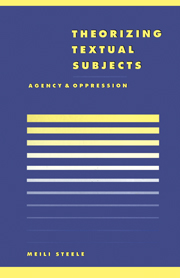Book contents
- Frontmatter
- Contents
- Acknowledgments
- Introduction
- 1 Stories of oppression and appeals to freedom
- 2 Language, ethics, and subjectivity in the liberal/communitarian debate
- 3 Theorizing narratives of agency and subjection
- 4 Truth, beauty, and goodness in James's The Ambassadors
- 5 The subject of democracy in the work of Ralph Ellison
- Conclusion
- Bibliography
- Index
5 - The subject of democracy in the work of Ralph Ellison
Published online by Cambridge University Press: 06 July 2010
- Frontmatter
- Contents
- Acknowledgments
- Introduction
- 1 Stories of oppression and appeals to freedom
- 2 Language, ethics, and subjectivity in the liberal/communitarian debate
- 3 Theorizing narratives of agency and subjection
- 4 Truth, beauty, and goodness in James's The Ambassadors
- 5 The subject of democracy in the work of Ralph Ellison
- Conclusion
- Bibliography
- Index
Summary
Ralph Ellison's work is the most complex ethical/political work discussed thus far, for it employs the ethical vocabularies of liberals, communitarians, and radicals. Ellison speaks the language of the liberal, who affirms individualism, justice, and liberty; he also speaks the language of the communitarian, who extols the virtues of different traditions and who is critical of liberal neutrality toward alternative views of the good; lastly, he plays the role of the radical, who excavates and unmasks the self-understandings of American culture across racial lines. In his work, the dynamics of language and subjectivity are ceaselessly called into question in a way they never are in James. For Ellison, the culture in which we are embedded is a deceptive one that must be relentlessly critiqued; unlike poststructuralists, however, Ellison does not set up the site of critique on an unspecifiable planet. He recognizes that cultural critique requires resources from the very ethical/political traditions that he is attacking. There is nowhere else to go. But how does he do this? What kind of site or subject position(s) enables Ellison to move with such flexibility among these vocabularies? Ellison himself takes up this issue in many of his works, particularly Invisible Man, which can be read as a meta-philosophical quest for a site for the telling of his story. This meta-philosophical dimension of his work will synthesize and dramatize the theoretical questions I have addressed throughout the book.
- Type
- Chapter
- Information
- Theorising Textual SubjectsAgency and Oppression, pp. 176 - 203Publisher: Cambridge University PressPrint publication year: 1997



